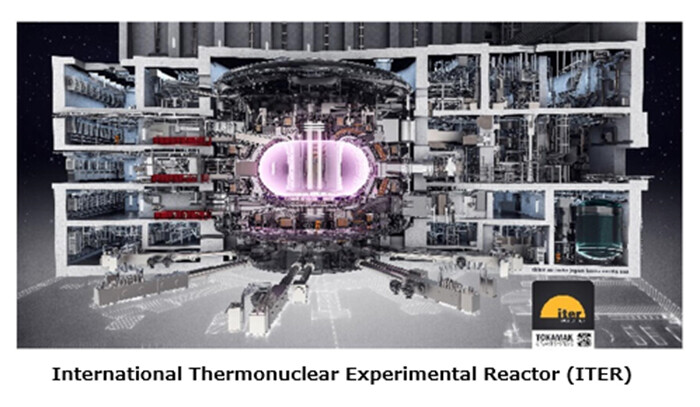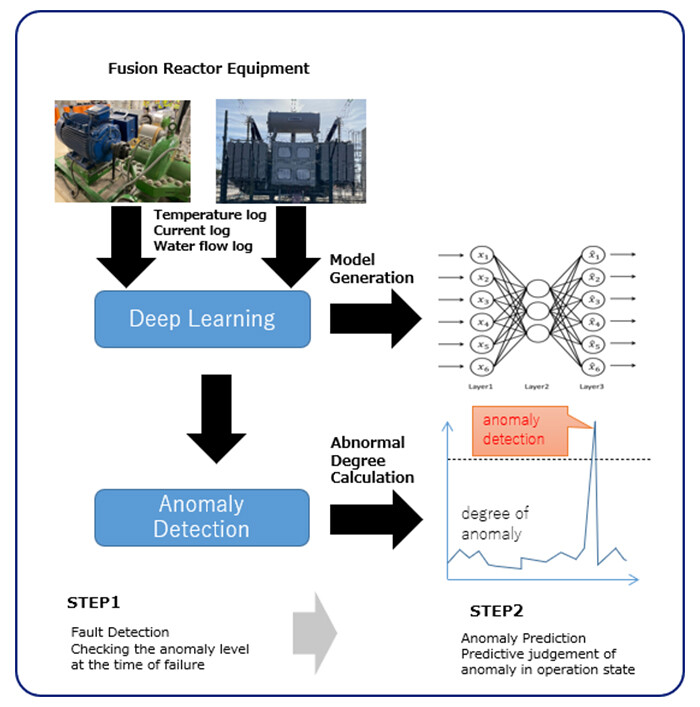Microsoft ends support for Internet Explorer on June 16, 2022.
We recommend using one of the browsers listed below.
- Microsoft Edge(Latest version)
- Mozilla Firefox(Latest version)
- Google Chrome(Latest version)
- Apple Safari(Latest version)
Please contact your browser provider for download and installation instructions.
November 21, 2023
NTT Corporation
Joint experiment with ITER for early anomaly prediction in peripheral equipment of experimental nuclear fusion reactor
Efficient promotion of fusion experiments through anomaly prediction detection to prevent failure
Tokyo - Nov. 21, 2023 - NTT Corporation (NTT) has concluded an Implementing Agreement with the ITER Organization [1] for "Experiments on Anomaly Prediction in Experimental Fusion Reactor Equipment" and has started joint experiments at this time.
NTT's AI-powered anomaly prediction technology and ITER's fusion facility will be studied to detect anomalies in experimental fusion reactor equipment at an early stage. This will potentially prevent equipment failure and contributes to smooth experimental operation.

1.Background
In response to environmental issues such as climate change, efforts to achieve carbon neutrality are increasing, and the creation of new energy sources is becoming increasingly important.
NTT entered into a strategic cooperation agreement with the ITER Organization in May 2020 to accelerate the creation of innovative environmental energy technologies and to contribute to reducing the environmental impact of customers, businesses, and society.
It is necessary to avoid equipment failures to continue the operation of fusion experiments. Therefore, we decided to work on anomaly prediction to detect equipment anomaly early. In the event of equipment failure, especially in a high-intensity, high-volume neutron or gamma-ray radiation environment, it will take time to repair the equipment, which will greatly affect the operation of fusion experiments. In the past, when a single value exceeded the threshold, it was determined to be an anomaly or failure. However, if an anomaly is detected at this timing, the equipment may fail immediately, making it difficult to continue the experiment due to the time required for recovery.
In detecting anomalies in network equipment, NTT uses the correlation of multiple types of data to predict future anomalies at an early stage. This technology, called DeAnoS [2], enables us to detect anomalies at an earlier stage than detection with single data.
We have been studying the applicability of DeAnoS to experimental fusion reactor equipment in cooperation with the ITER Organization. Specifically, it was confirmed that the circulation pump, which is one of the components of the experimental fusion reactor, can be judged at the time of failure, and we were able to obtain prospects that this technology can be applied to the experimental fusion reactor equipment. Based on the results of this study, we will proceed with verification of fault detection for various equipment and further advance joint experiments with the ITER Organization that extend to anomaly prediction.
2. Details and initiatives of the joint experiment
NTT's anomaly prediction technology is used to understand the normal status of nuclear fusion experimental reactor equipment, detect faults, and predict anomalies.
Step 1: Fault detection in various devices (feasibility study for devices other than circulation pumps)
Step 2: Anomaly prediction in equipment (analysis using long-term data)
 Figure 1 Overview of Anomaly Prediction Technology
Figure 1 Overview of Anomaly Prediction Technology
3. Roles of each company
■NTT
- Analysis of normal status, fault detection and anomaly prediction using Deep Anomaly Surveillance technology "DeAnoS"
- Evaluation of validity of analysis results
■ITER Organization
- Acquisition and provision of operation data for experimental fusion reactor equipment
- Providing a validation environment
- Validity evaluation in fault detection and anomaly prediction results
4. Outlook
This joint experiment will study the effectiveness of the anomaly prediction technology and consider the feasibility to the smooth operation of fusion experiments by applying it as a maintenance tool to experimental fusion reactor equipment. We will also use our knowledge and various technologies to expand the system to large-scale systems such as plants.
[1]ITER Organization
https://www.iter.org/
[2]DeAnoS
https://journal.ntt.co.jp/article/4149
About NTT
NTT contributes to a sustainable society through the power of innovation. We are a leading global technology company providing services to consumers and business as a mobile operator, infrastructure, networks, applications, and consulting provider. Our offerings include digital business consulting, managed application services, workplace and cloud solutions, data center and edge computing, all supported by our deep global industry expertise. We are over $95B in revenue and 330,000 employees, with $3.6B in annual R&D investments. Our operations span across 80+ countries and regions, allowing us to serve clients in over 190 of them. We serve over 75% of Fortune Global 100 companies, thousands of other enterprise and government clients and millions of consumers.
Media contact
NTT
Public Relations, NTT Information Network Laboratory Group
nttrd-pr@ml.ntt.com
Information is current as of the date of issue of the individual press release.
Please be advised that information may be outdated after that point.
NTT STORY
WEB media that thinks about the future with NTT










